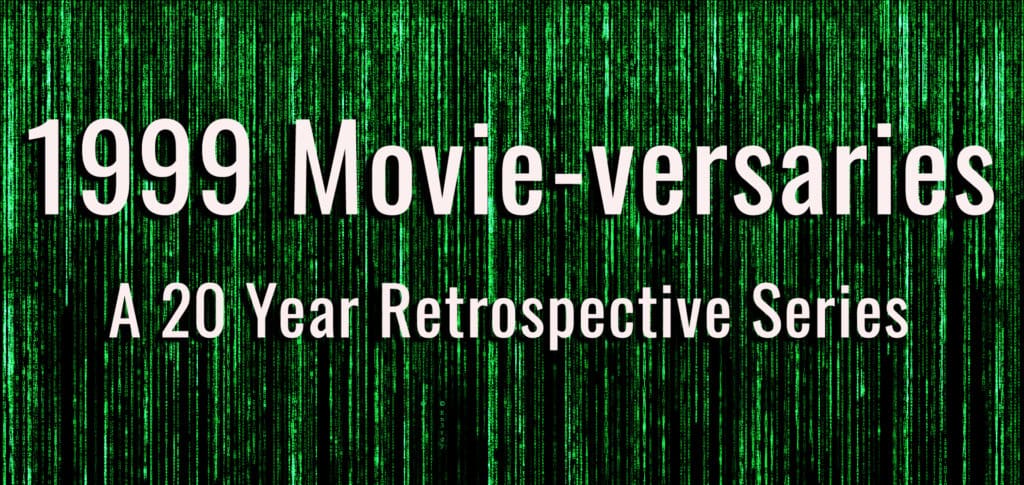1999 was a big year for movies. It was the year that The Matrix‘s slow-motion bullet influenced action movies for years to come. It was the year American Beauty won Best Picture at the Academy Awards and Oscar fans have been arguing about it ever since. It was the year Pokémon jumped from Gameboys and TV to the big screen. And worst of all, it was the year that disappointed a generation of Star Wars fans with the release of The Phantom Menace.
To celebrate that landmark year in film’s 20th Anniversary, The Pop Break continues its year-long retrospective of 1999’s most influential (at least to us) films with writer, Michael Vacchiano, looking back on a film that explores issues just as relevant now as they were in 1999, Boys Don’t Cry.
Gender identity is one of the biggest hot-button issues facing society today. Conversations over said topics never seem to be easy—no matter what your stance may be. Even the great artistic medium of film rarely seems to have a voice on the issue, but the landmark cinematic year of 1999 helped to bring some change.
Writer/director Kimberly Peirce’s low-budget, real-life drama, Boys Don’t Cry, shined a light on gender issues that many outside the LGBTQ+ community were probably not familiar with. Even now, 20 years later, it is still an extremely tough movie to watch. Nonetheless, it is also still a highly important one.
Hilary Swank plays Brandon Teena, a young, transgender man attempting to live his life in rural Nebraska. Assigned female at birth, he is constantly met with animosity and ignorance from those who think he’s just a “freak” with an identity crisis. Even Brandon’s own openly gay roommate disapproves of his lifestyle and kicks him out.
Upon arriving in the small town of Falls City, Brandon soon makes a new circle of friends including single mother Candace (Alicia Goranson, aka original Becky on Roseanne) and mentally unstable ex-con, John (Peter Sarsgaard). But after meeting and being instantly smitten with local beauty and wannabe singer Lana (Chloe Sevigny), Brandon believes he can finally find the love, happiness, and most of all acceptance that he’s been searching for.
Boys Don’t Cry didn’t make the giant splash, as a whole, that a lot of other films did in 1999, and it may not even be as well-remembered. However, gender identity in mainstream film was rarely touched on as seriously in the decades leading up to it. Yentl and Tootsie centered around swapping gender roles mostly for comic effect, and The Crying Game used a transgender person primarily as a plot twist for its mystery thriller storyline. And yes, homosexuality has often been a theme for dozens of movies in history, and it’s sometimes been treated with great care and respect in the process. Peirce, herself openly gay and a social activist as well as filmmaker, deserves massive credit, though, for bringing Brandon’s legacy to light in a way that neither degrades nor glosses over the topic of gender identity.
Huge credit also goes to Swank, who up to this point was mostly known for the title role in The Next Karate Kid as well as a season-long stint on Beverly Hills, 90210. The actress inhabits her character on screen much in the same way that Brandon tries to live his everyday life. Physical metamorphosis aside, Brandon tries to emulate a tough machismo and chivalrous nature, yet still maintains a sensitive and affectionate side towards the women in his life.
It’s an incredible performance from Swank that makes her as close to unrecognizable as can be, and it’s no wonder she stormed the awards circuit that year en route to winning the Oscar for Best Actress. Her highly deserved victory led to the underrated Christopher Nolan thriller Insomnia with Al Pacino and Robin Williams—not to mention another entry into the inspirational-teacher subgenre with Freedom Writers. Swank’s greatest success (besides Boys, of course) came in 2004, with Clint Eastwood’s Million Dollar Baby, where she played underdog boxer Maggie Fitzgerald. While not as socially conscious a role as Brandon Teena, Swank’s acting still goes toe-to-toe (pun intended) with screen legends Eastwood and Morgan Freeman and helped her win a second Academy Award.
Sevigny had made her screen debut a few years prior with the bleak indie Kids before getting the part of Lana. Her role in Boys earned her plenty of notice and awards recognition, including an Oscar nomination for Best Supporting Actress. Sevigny’s extensive resume also includes memorable films like American Psycho and Zodiac, as well as some acclaimed TV series such as Big Love and Bloodline. Sarsgaard had made his own film debut, like Sevigny, only a few years before with Dead Man Walking. His credits since playing the emotionally volatile John in Boys include such varied and well-received films as Shattered Glass, Garden State, Kinsey, Jarhead, An Education, Blue Jasmine, and Black Mass.
As for Peirce, she has directed episodes of various television series since Boys was released. Her number of feature films, however, have been few and far between, namely 2008’s post-war recovery drama Stop-Loss and 2013’s remake of the classic horror film Carrie. Nevertheless, she is best remembered for her efforts in bringing the real-life story of Brandon Teena to the screen. While it’s an excellent movie with a lot to say, admittedly, Boys Don’t Cry is not always an easy movie to watch two decades later. But with gender identity topics still so prevalent today, it’s still a movie that needs to be seen.
Some recommended further reading on Boys Don’t Cry:
How I Broke, and Botched, the Brandon Teena Story – The Village Voice


